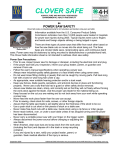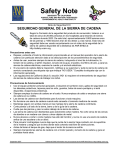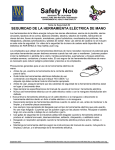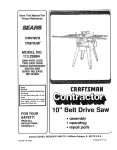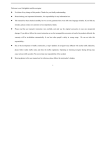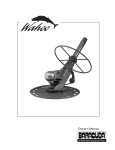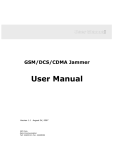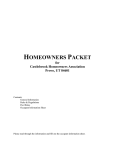Transcript
SafetyNotes Risk&SafetyServices ENVIRONMENTAL HEALTH AND SAFETY Safety Note #5 TABLE AND RADIAL ARM SAW SAFETY It is estimated, by the Consumer Product Safety Commission, that stationary power saw use results in an annual total of 30,000 hand and finger injuries requiring hospital visits. Approximately 3,000 of the annual injuries involve amputation of one or more fingers. Video E-061 Saws/Grinder/Drill Press Instruction is available from the ANR Environmental Health and Safety Library at http://safety.ucanr.org. Table or Radial Arm Saw Precautions: Prior to use, inspect table or radial arm saw for damage or disrepair. Remove damaged table or radial arm saw from use by attaching red tag that states “DO NOT USE.” Complete red tag with appropriate information. Always follow user’s manual specifications when operating a table or radial arm saw. Always wear industrial-quality safety glasses or a face shield when using stationary power saws. Do not wear loose fitting clothing or jewelry that can be caught by moving parts. Pull back long hair with a band or wear long hair under a cap. As appropriate, wear suitable hearing protection. Keep saw fences, blade guards, spreaders, and antikick devices in place and functioning properly. Assure saw blades are clean, sharp, and correctly set so that they will cut freely without forcing the work piece against the blade. California Code of Regulations (CCR), Title 8, Section 4300 requires a push stick of suitable design be provided and used when working with a table saw. A push stick is especially important to use when cutting short or thin pieces of stock on a table saw. Never feed the work piece faster than the saw can accept. Prior to sawing, check stock for nails, screws, or other foreign objects. Assure that the table saw blade is set slightly above the thickness of the stock to be cut. Never make free-hand cuts with a table saw. Guide stock using a rip fence or mitre gauge. Never reach behind, over, or under a saw blade unless it has stopped turning and the power has been disconnected. Always disconnect the power source before changing or adjusting the saw blade. When finished, clean saw dust and scrap stock from saw table (and floor) and dispose of in trash. Rev. July 2008 Additional EH&S information may be accessed at the ANR Web Site at: http://safety.ucanr.edu/

